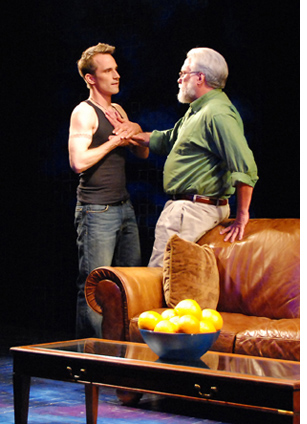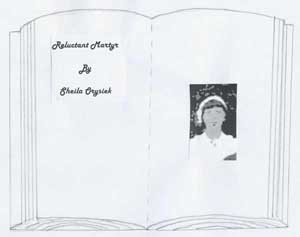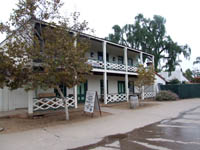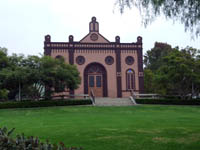| |
|

Friday-Saturday, June 6-7 JFS~Judaism on the Wild Side


Sunday, June 8 Temple Solel~Tikkun Leil Shavuot


SUNDAY, JUNE 8 Ohr Shalom Shavuout Service




LETTER FROM JERUSALEM
Weighing Obama and McCain from an Israeli perspective, each has drawbacks
By Ira Sharkansky
 JERUSALEM—While we are waiting for what may be the final chapters in the political career of Ehud Olmert, it is appropriate to spend a few moments on American politics. JERUSALEM—While we are waiting for what may be the final chapters in the political career of Ehud Olmert, it is appropriate to spend a few moments on American politics.
Barak Obama appears to be the Democratic nominee. His status relies on superdelegates, but I hear no one saying that Hillary Clinton or her people will press some of them to change their mind for the good of the party.
 What is good for Israel? I do not assert that this is the appropriate question for Americans, but it is the question that will guide me for the next few words. What is good for Israel? I do not assert that this is the appropriate question for Americans, but it is the question that will guide me for the next few words.
I hope we are beyond the idiotic Obama bashing. Barak Obama is not a Muslim despite his father's heritage or his own middle name. He did not swear allegiance to the United States on the Koran upon entering the Senate, and there is no evidence that he had a Muslim education.
There remains a problem with his affiliation with a minister who should be consigned to the ghetto in hell reserved for anti-Semites. Obama renounced the Reverend Jeremiah Wright, but I hold it against him for not doing it several years earlier.
Obama spoke, along with others, at a convention of the pro-Israel interest group, AIPAC (American Israel Public Affairs Committee). I heard parts of a speech that could have been delivered, in Hebrew, at a convention of Likud in Israel. Strong words against terror and Hamas; Israel as a Jewish state; an undivided Jerusalem as Israel's capital. The only sentiments missing were support for expanding Jewish settlements, a commitment to Greater Israel, and both sides of the Jordan. The last two of those have also been absent at recent Likud conventions.
Response from the Palestinian leadership is far from happy.
The speech, delivered with typical Obama clarity and excitement, leaves me wondering about earlier comments when he said that he could support Israel without signing on to the program of Likud. There is also something of a clash between his overall theme of change, and leaving things as they are on the Israel-Palestine front.
Having heard about politics since the presidential election of 1944, I have learned not to accept every word of every politician at face value. The setting influences the content of a speech. Sooner or later there will be a speech for Arab-Americans. Nonetheless, it is difficult not to be impressed with Obama's position. Were I voting in the United States, I am not sure that I would vote for him, but the reasons go beyond his statements on Israel, per se.
Per se is important, because Obama's posture on Iraq is relevant to Israel. I have never been enthusiastic about America's wars in Iraq or Afghanistan, but I would be even less enthusiastic about the quick exit that Obama is advocating, and which is likely to be the darling of a Democratic Congress. What I see in an Iraq that is largely and quickly free of American troops is first, a great slaughter pursued by nothing like the rules of war recognized by civilized countries; and secondly, a threat that is likely to touch other countries in the Middle East.
I must admit, further, to be worried about a Democratic Congress, along with a Democratic president, putting pressure on Israel to be accommodating with the Palestinians, while not much pressure on the Palestinians to be accommodating with Israel.
I would like John McCain to be a few years younger and a bit healthier, but you have to take what you get in politics, and weigh the alternatives. Congress cannot make foreign policy alone, and the likelihood of a Democratic Congress adds to McCain's appeal.
I wish good health and long life to both of the major party candidates, and to their running mates.


THE HISTORY MAN
UK academic boycott of Israel resurfaces
By Lloyd Levy
 LONDON—Just when we thought we had fought off the attempt by the UK university academics union (the UCU), to boycott Israeli academics and institutions, the boycott seems to have sneaked back onto the agenda. LONDON—Just when we thought we had fought off the attempt by the UK university academics union (the UCU), to boycott Israeli academics and institutions, the boycott seems to have sneaked back onto the agenda.
A few months ago, an earlier attempt by the UCU to attack Israel, was beaten back when several prominent Jewish lawyers were able to point out that the boycott was illegal. I believe Alan Dershowitz was one of the lawyers involved.
However last week, the UCU asked its members “to consider the moral and political implications of educational links with Israeli institutions.”
The Union will “promote a wide discussion by colleagues of the appropriateness of continued educational links with Israeli academic institutions” and notes the “apparent complicity of most of the Israeli academy.”
This last comment is particularly bizarre, when one considers the ongoing criticism of Israel by academics within Israeli universities themselves. In my opinion, no one has done more harm to Israel than these left wing academics who write books and articles against their own country, and it is thus ironic that Israeli academics should be the boycott target.
The UCU denies they are instituting a boycott, but as the saying goes- “if it looks like an elephant, and smells like an elephant, then it is an elephant.” So it is with a boycott.
It is strange how the academic world can become a hotbed of extremism and hatred. We all know that the Nazis got much support from academics, and that Jewish teachers and students were excluded from colleges very early on in the Nazi era. If the UCU boycott succeeds, then Jews will be again subject to particular exclusion and persecution in universities in a major Western European state.
Meanwhile , English football has been dominated by the news that Avram Grant, the Israeli manager of Chelsea Football Club, has been sacked after just eight months. The British newspapers could not get their heads around the idea of a Jewish manager of one of the premier clubs, and vilified him from the start. Yet his dignity did generate him much personal support in the end, and he was no doubt mollified by a megamillion pound payoff.


THE JEWISH CITIZEN
When octogenarian father and 40ish son both are single, who gives dating advice?
Assisted Loving by Bob Morris, HarperCollins, 2008, 288 pages, $24.95.
By Donald H. Harrison
 SAN DIEGO—Yippie Leader Abie Hoffman once wrote the counter-culture memoir Steal This Book, a title which undoubtedly drove booksellers crazy. Now Bob Morris has a book out with a jacket that seems to scream, “Don’t Buy This Book!” The cover bears as unflattering a photo as one could imagine of an 80-something man, sitting on a deck chair, his stomach hanging over his swim trunks and his mouth crammed with an oversized bite from a sandwich. Publicist Katherine Beitner says the photo is of a friend of Morris' father, so what's the point? SAN DIEGO—Yippie Leader Abie Hoffman once wrote the counter-culture memoir Steal This Book, a title which undoubtedly drove booksellers crazy. Now Bob Morris has a book out with a jacket that seems to scream, “Don’t Buy This Book!” The cover bears as unflattering a photo as one could imagine of an 80-something man, sitting on a deck chair, his stomach hanging over his swim trunks and his mouth crammed with an oversized bite from a sandwich. Publicist Katherine Beitner says the photo is of a friend of Morris' father, so what's the point?
The author evidently wanted everyone to know how coarse some folks, including his father, could be at times, not at all in keeping with the author’s own prissy tastes. Notwithstanding how frustrating, even embarrassing, his father Joe could be, and no matter how often he upbraided, scolded or cajoled his father to change his slovenly ways, Bob couldn’t hide his underlying affection for the old man.
No matter how deep in the dumps Bob felt about his own life and career as a newspaper columnist and would-be playwright, his father remained the upbeat believer, the beamer, the man who had complete and utter faith that there was no better, nor more talented person than his son the writer.
Assisted Loving opens at a Jewish cemetery the two men visit following the death of Ethel, Bob’s mother and Joe’s wife. She was a long-suffering librarian who had done her best to arbitrate the frequent disputes that broke out between her sloppy husband and her often pretentious son.
Although Bob bickers and Joe pacifies throughout the book, the two men come to realize after awhile they have much in common. They both are lonely for companionship. The father wants his son’s advice on dating—not the first choice of advisor that anyone else might make. Fortyish, gay, and never in a committed relationship, Bob is too hypercritical to find another man able to meet his exacting standards. How in the world would he find a suitable woman for his father?
Nearly every woman whom Bob scouts has a more highly refined sense of fashion and table manners than his father does—and it’s no wonder that some of his dad’s subsequent dates go nowhere. Nevertheless, his father remains steadfastly in the dating game. Disappointment doesn’t prompt Joe to curl up in retreat—as has been Bob’s habit. Eventually , on his own, Joe finds someone a little less elegant than Bob might like, but someone who is more compatible than someone Bob might recommend. While Bob concentrates on the lady’s perceived flaws, Joe focuses on the woman’s finer qualities. Now who is assisting whom in the game of loving?
As Bob has to somehow get past his father’s less attractive qualities to see the handsome, caring man within, so too must book-buyer get past the cover. Either that, or HarperCollins should consider reissuing the cover. In photographs inside, we see that Joe could clean up quite nicely.
 

ARTS IN REVIEW
Programme Request? Take A Number
By Carol Davis
 SAN DIEGO—Recently I was privileged to see two very good shows, neither of which I had seen before. SAN DIEGO—Recently I was privileged to see two very good shows, neither of which I had seen before.
Both were short; one about 60 minutes, the other a little less, but don’t let the timing of such things fool you. So much information was packed into each show that the topics are still running around in my brain. In Caryl Churchill’s A Number, cloning is the theme of the play and in Franz Xavier Kroetz’ Request Programme translated by Katherina Hehn AND presented by Ion Theater, the issue is about suicide and isolation. OK, you’re wondering what’s a nice Jewish girl from Massachusetts like me doing spending her time in that kind of a theatre environment? Well, it’s just plain good theatre with relevance, that’s what!
In case you might want to argue the relevance case, a partial Google search on Jewish Opinions on Cloning came up with 238,000 hits. NO! I did not check them all out but here are a few. It includes My Jewish Learning: "The Cloning Debate", Eric Cohen on "Cloning & Judaism" on National Review Online, "Jewish Groups Back Therapeutic Cloning" (Washingtonpost.com), "Cloning Hitler and Einstein," "Judaism and Stem Cell Research" onTorah.org and so it goes. It’s a hot and current topic and Churchill seems to have hit the hot button with it in A Number. It runs through June 29 at the Cygnet Theatre on the Rolando Stage.
And on the issue of the Jewish law and commentary on suicide, over eight million results could be researched, the first being Jewish Law- Commentary/Opinion. The gamut runs in every direction from the most religious to the secular to the civil laws governing it. This piece, Request Programme, runs until June 14 at The Lab at The Academy of Performing Arts in Mission Valley- 4580B Alvarado Canyon Road. It’s for mature audiences only and no one under than 17 will be admitted. For you to see another argument either for or against either one or both of these issues or just to witness excellent theatre, your job is to make plans to put yourself in these theatre seats.
Franz Xavier Kroetz is a German playwright, actor and film director whose works have been produced by Sam Boardman-Jacobs and Oren Jacoby. Request Programme stars Linda Libby. One of San Diego’s premiere actors Libby is simply amazing. She plays Miss Rasch, a lonesome, alone and disenfranchised woman in mid-life whose existence is dominated by repetition, boredom and emptiness.
From the time she arrives home from work until she gets up for work the next day her life is spent in a claustrophobic apartment (Matt Scott and Claudio Raygoza) with her radio, her rug hooking and herself, alone. She talks to no one, not even herself, not a peep or sound, and from the looks of things, her one kind of recreation is listening nightly to her favorite radio show, Request Programme.
And so we meet Miss Rasch one night when she arrives home from what we must assume is a boring job. Over the next hour, without a word delivered, just facial expressions, she goes through her nightly routine in silence. Sometimes she looks absolutely absent of anything, sometimes mild amusement as when she hears a piece of music on the radio she likes or a screwing up of her eyebrows when she can’t seem to understand why the announcer of Request Programme (J.D. Steyers) chose to play “Slaughter on 10th Avenue”. She’s satisfied, or so it appears, with the other selections, a Chopin nocturne, a Schubert rondo and a Mozart piece. She looks as if she’s surprised when the program comes to an abrupt end. Did her favorite piece not get played?
Yet, while the music may be her connection to the outside world or a just diversion away from her boring life and certainly company for her, it’s her mundane routine that captures the evening, so concise, mechanical, methodical and deliberate is she, that the feeling of doom creeps into the psyche sooner rather than later. There are times a pin would have been heard dropping in the theatre if it happened. We were advised to turn our cell phone rings off, and not even put it on vibrate. The silence is deafening.
Under Glenn Paris’ deft direction, Libby is picture perfect as she obsesses about her cleanliness, the way she sets the table, the fuss over a blemish on her cheek, her making a sandwich, frowning over a mistake in the pattern of her hooked rug, heating and pouring tea on her hot plate, going to the bathroom, checking the windows, hanging her clothes in the armoire and picking out her next day's outfit, (Judy Watson) absent mindedly flicking lint from the jacket, setting the table for her breakfast, choosing colors for her hooked rug, scrubbing out her kitchen sink after each bit of food she consumes, repeatedly washing her hands, applying foot cream to her feet, clipping her toenails, pulling out her sofa bed and getting it ready for sleep, placing her glass of water next to her bed, curling her hair, and finally getting into bed with a book she’s not into.
All this without a word and with emotions suppressed for the entire evening, but finally with the look of a hawk staring off into space after she finishes off the bottle of pills she systematically takes when sleep refuses to come, the house goes dark. Libby’s performance is a must see, her character is as unsettling as it is cause for concern in this production at Ion Theatre. It is certainly worth a try. It’s difficult for me to keep mum on this one.
 Cygnet Theater's production of A Number has just two characters, Slater (D.W. Jacobs) and Bernard, B2 and Michael Black (all played by differently and yet similarly by Francis Gercke). Cygnet Theater's production of A Number has just two characters, Slater (D.W. Jacobs) and Bernard, B2 and Michael Black (all played by differently and yet similarly by Francis Gercke).
A sighting: When I was in Toronto last month, I heard someone calling after me as I was headed into the train station. After several attempts, I turned around to look back at a total stranger. As she approached me, she apologized profusely thinking I was someone else. “You look exactly like my friend…”, she said. “You could be her double”. How many times has that happened to you? And what if the double was you, cloned from the original? Or, what if you were the original and the look a like was cloned from you?
Imagine if there were five, ten, twenty of you roaming around, working, raising a family, going to the theatre? The implications are endless and that’s the essence of A Number, now in fine and thought provoking production.
Churchill’s 2002 work, now in its San Diego premiere,
)
lasts fifty minutes and is as economical a production as can be. However brief it is, there are enough pauses to make one want to fill in the blanks to move it along. That said, director Esther Emery, has found the right balance between the spoken and the pauses, to give one time to think of the what ifs. Churchill’s dialogue is similar to that of Harold Pinter's. It’s deconstructed, clipped and disrupted, stops, trails off and lets the other character pipe in either finishing the thought or starting another thought. It’s an effective tool which can be heard in both Mamet and Pinter plays, but on opening night the timing was a bit off. By now both Jacobs and Gercke should be in sync with each other and have it a down to good rhythm.
The play opens with Salter the father, looking out a picture window of what seems to be his living room. The son excitedly comes into the room. Bernard has learned that he is not the only son of Salter. He has an older brother, not by much, from whom he has been cloned. “Are there others?” he asks concerned. And “why?” Salter is not only confused that Bernard has found out about his being cloned, but he also confused about exactly how to tell his son the ‘why’.
From this question things get a little fuzzy as the story takes on different responses to the same questions and all depending on which incarnation of Bernard we are looking at or listening to. It seems the first Bernard we meet is the apple of his father’s eye: a perfect son who is now beside himself. The thought that he is no longer original, unique or one of a kind throws him for a loop. How many others, he insists on knowing!
The second one or rather the ‘original’ was perfect until his mother died and his father could no longer care for him or so he says. He was sent away and on returning as an adult we see a violent and dangerous Bernard (Gercke is excellent) threatening to kill. He demands to know what happened when he was a boy. It seems he was sent away but not before the idea of cloning came to Salter’s mind. According to Salter, he wanted his perfect son back. And so it goes until we meet the whatever number of the cloned sons, Michael Block, who looks exactly like the first two, but couldn’t be more different in personality— a situation that completely baffles Salter.
While Salter tells a different story to each son about how he happened to come up with the idea of cloning, the one constant that runs through the conversation is how much money he can get for what he did. In typical Churchill form, the playwright throws a boomerang back at us not only addressing the social, psychological and scientific ramifications of what the father has done, (who knows how many more have done it) but she leaves the prospect for a new conversation open to discussing genetic engineering, the pros and cons.
Together with George Yés' eerie sound design, Jungah Han’s set (it looks like the inside of a lab or an operating room with blue tiled walls and floor, a huge bay window, a sofa coffee table, bowl filled with perfectly matched oranges which are used for emphasis and a lamp), Veronica Murphy’s costumes, Matthew Movotny’s excellent lighting design and the seasoned abilities of acting of two very talented actors A Number should be number one on your ‘to see’ list.
See you at the theatre.


 Editor's Note: This is the eleventh chapter in our serialization of Reluctant Martyr, a historical novel by our columnist Sheila Orysiek. It is based on the experiences of her aunt. In each Friday-Saturday edition of San Diego Jewish World, we will run another installment of the 21-chapter book until its conclusion. We thank Sheila for granting us first publication rights to her book. Comments to the author are welcome at orysieks@sandiegojewishworld.com Editor's Note: This is the eleventh chapter in our serialization of Reluctant Martyr, a historical novel by our columnist Sheila Orysiek. It is based on the experiences of her aunt. In each Friday-Saturday edition of San Diego Jewish World, we will run another installment of the 21-chapter book until its conclusion. We thank Sheila for granting us first publication rights to her book. Comments to the author are welcome at orysieks@sandiegojewishworld.com
Chapters 1 2 3 4 5 6 7 8 9 10 11 12 13 14 15 16 17 18 19 20 21
Reluctant Martyr—Chapter Eleven
As the Depression deepened the neighborhood of immigrants was particularly hard hit; they were people struggling to learn the language and just beginning to make their way in this new country. When financial problems began and people could not pay the rent, landlords were quick to evict them but as the crisis accelerated it became much more difficult for these same landlords to find new tenants who could pay the rent. Eventually the owners then had to offer inducements to get people to rent one house over another as there were quite a number standing empty. One of these inducements was to offer a prospective tenant the first month rent free.
Desperate families who were evicted from one house often moved right next door, or just down the street to get a month of free rent. They hoped that perhaps by the end of the month a miracle may have occurred and the family’s circumstances improved. Most of the time, however, they just kept moving from one house to another, one month after month.
The lady who lived next door to Hannah and Jahn was an elderly widow from Latvia. She was a quiet person and never joined the neighbors sitting on the sidewalk on a summer’s eve. She was hardly ever seen. One morning people from her church left on her doorstep a large basket of food; apparently someone felt she was in need. She, however, knew the Italian family across the street had several children and a father intermittently employed. So, as Jahn was walking past her house, she rapped on her front window to attract his attention, and opened her door.
“Mr. Perris! Mr. Perris, if you please!”
“Yes, Mrs. Berensky?” Jahn answered as he removed his hat.
“Someone left me this food. But to be honest I don’t eat much, I don’t need it.”
“What do you.....?”
“Please, Mr. Perris, carry and put it over there.” She pointed to the steps of the Italian family. “There are a lot of little ones and I’m sure they can use it.”
“That’s very good of you, Mrs. Berensky.”
“But you won’t tell anyone?” she cautioned.
“No, no. Of course not.” And he quickly picked up the basket and set it against the door of the house of the Italian family. When he looked back, she nodded her approval through the window.
That family was happy to receive the basket, but they knew the mother of the Irish family was trying to raise eight hungry children all by herself so they put the basket on her step. And there it stayed.
Hannah and Jahn could see that soon they would not be able to pay the rent on the State Street house. Hannah, at wits end, decided to try and find work at the old sewing factory where she had been employed when she first came to Philadelphia. She didn’t tell Sharona or Etah, nor even Jahn as she knew it would make him unhappy. She chose a time when they were all out of the house, dressed in her best skirt and blouse, and walked over. She was so intent on what she would say to her old boss, Mr. Blaski, that she didn’t notice the boarded up windows until she was right beneath them. The door was nailed shut and the place was empty. It was a great disappointment because Hannah thought that at last she had found a way to help Jahn. While she was worried about their dire circumstances in general, her greatest concern was her husband.
Uncle Joseph realized that the one invitation to supper was the sum total of Yarosh’s response to the family’s financial crisis. So he decided to offer Jahn a job washing windows. But, the way Uncle Joseph offered Jahn a job was typical of him. He rushed over one evening and all out of breath knocked on the front door. Etah opened it and let him in.
“Etah, good evening, where is Jahn? I haven’t much time. Is he here?”
“Yes, Uncle, in the back room.”
He walked quickly to the area in back of the dining room where the piano was. “Jahn....”
“Uncle,” Jahn looked up in surprise, “it’s nice to see you.”
“I haven’t much time,” Joseph rushed on, “one of my workers just quit, left town just like that,” he snapped his fingers for emphasis. “And, now I’m desperate for someone to help tomorrow. Can you help me out?”
“Of course, I’ll be glad to help you anytime, Joseph.”
“It’s washing windows.”
“I’ll be glad to help you.”
Joseph clapped Jahn on the back. “That’s wonderful! I’m going now.” As he left he looked back over his shoulder, “Can you be at my office at 5:30 in the morning?”
“Of course, of course!”
Joseph waved good-bye and was gone. It was all so quickly done.
The office of Joseph’s window cleaning business was just a few doors down from the synagogue on Girard Avenue, almost around the corner from his house on Union Street. Twelve men assembled there every morning at 5:30 a.m., sorted out the equipment they needed and picked up their assignments for the day. The next morning Jahn was one of them. It must not be thought that he considered such work at all demeaning. It was honest work and he was happy to do it. As the one day stretched out to a week and then from week to week, he was content to be working again. It felt good to come home truly, healthfully, tired; his face seemed to brighten. The money he earned was the same amount that Joseph paid to all his other workers, not a great sum, but enough for a family to live on and pay the rent. While of course Hannah was glad that Jahn was again able to earn a living, her heart ached to see her beloved husband stoop to such labor. She had always despised manual labor and she found it an embarrassment.
“Jahn,” she said after supper, “this work is so hard! I hate having you slave like this!”
“I don’t mind, Hannah,” he assured her.
“Your hands in cold water, and ladders, climbing up and down.”
“Well that’s how to get to where the windows are,” he laughed.
“Jahn, I’m serious! This work is not for you! I’m so ashamed.”
“Ashamed of what? Earning a living? I am NOT ashamed. It is honest labor - and it needs to be done. Besides if this is not for me, what is?”
“The piano, music.”
“Dreams! That is dreaming!” he said as he threw up his hands for emphasis.
“But, Jahn...” she protested.
“Hannah, I would much rather be doing this than not be doing this. The worst is doing nothing. I am not above this work...WE are not above this work.”
Hannah was right, the work was hard. Heavy buckets of water had to be carried up ladders and the ladders themselves were carried from place to place and position to position. In the winter, hands that were immersed in water and then exposed to a chill wind soon reddened, cracked and bled. The hands of a pianist suffered particularly, but Jahn was truly grateful for the chance to earn a livelihood.
......................................................
The candy store on the corner was a meeting place for young and old. Outside of it on Cambridge Street was a pay telephone housed in a little booth with a folding door that squeaked and the whole thing leaned up against the wall. What a marvelous invention! For a nickel, communication could instantly be made with anyone who had a telephone. Since few people in that neighborhood had one of their own, this one on the street corner was wonderfully convenient when the need arose. To celebrate the family’s new financial stability, Jahn decided to get a telephone installed in the house. “Modern times are coming,” Jahn said as he sat on his chair in the parlor, “and I think we should get a telephone.”
Hannah looked at him from her place on the sofa. “A telephone? I don’t need that! Who would I call?”
“Well, you could call Aunt Nora.” But Hannah grimaced as if in pain. “Or you could call Mr. Becker to see if he has the cheese you ordered and you wouldn’t have to walk over in the rain. Or Gimbel's downtown to check on whatever you want.”
“I don’t think...” she began doubtfully.
“Or if there was an emergency, like a fire, you could call for help. The police, for instance. What do you think of that?”
“What would we put the telephone on?” she asked.
He looked at her in real surprise, he had never considered that very important. But he suggested, “We could buy a table. You could call Gimbel's and ask if they have tables for a telephone!”
“How can I call Gimbel's?”
“That’s why we need a telephone!” he said triumphantly.
When the telephone was connected and placed on the table they had bought, it looked almost enshrined. Hannah was very proud of it. It was all their very own; well, almost their own. Telephone lines were shared, sometimes with as many as three other households, so when the ear piece was picked up another conversation could be heard. It was considered in poor taste to keep on listening, but it did spice up many a dull afternoon.
Shortly after Jahn started his job washing windows, Sharona began to complain of pain in her left arm. She was also unable to catch her breath and at times her stomach ached. Etah took over more of the chores, but it didn’t seem to help. Finally after many weeks, Sharona conceded a doctor might have to be consulted. Such a decision was not lightly made. Consideration had to be given to paying the doctor and worse yet, there was the potential for further costs. Added to this, was the stress of having a strange man come so close, even professionally, and so Sharona tried one last time to avoid what to her was an ordeal.
“We can’t afford it.” Sharona told Hannah as they washed the dishes after supper.
“But you said your stomach hurts. So, a doctor can tell you why.”
“It doesn’t hurt me now. Besides I don’t trust them.”
“There is a good one on Parkside Avenue....”
“How do you know he’s good?” Sharona asked.
“I heard people talking!”
“Talk! Talk is cheap. Doctors are expensive.”
“You must go.” Hannah insisted.
“Maybe if I eat less, it won’t hurt.”
“If you eat less so will I! No, you have to go.”
So Hannah used the new telephone to call Dr. Rockman’s office and made an appointment for her mother for the next week.
(


ADVENTURES IN SAN DIEGO JEWISH HISTORY

Robinson-Rose House
|

Old Temple Beth Israel |

Lawrence Family JCC |
Editor's Note: We are reprinting news articles that appeared in back issues of various San Diego Jewish newspapers. You may access an index of the headlines of those articles by clicking here. You may also use the Google search program on our home page or on the headline index page to search for keywords or names.
U.J.F. Off To Flying Start: San Diego Aware of Unprecedented Need in 1947—Geared to Meet It
From Southwestern Jewish Press, March 27, 1947, page 1
With the announcement that the Jews of San Diego had already raised more money than in the entire campaign of 1946, and a call for an all-out effort on the part of the Jews of San Diego, community leaders opened up the 1947 United Jewish Fund Campaign for $350,000 last night at the kick-off dinner at the San Diego Hotel. Joseph Schildkraut, stage, screen and radio star, Joseph J. Schwartz, European director of the Joint Distribution Committee, and Edwin Rosenberg, president of the United Service for New Americans, appealed to San Diego for the United Jewish Appeal.
Eli Levenson, president of the United Jewish Fund, in asking the assembled leaders to greatly intensify their efforts to insure the success of the drive, said that only the moral and material support provided by American Jews through the United Jewish Appeal's campaign for $170,000,000 has thus far kept up the hope and the morale of 250,000 homeless survivors of Nazi oppression.
Dr. Joseph J. Schwartz, European director of the Joint Distribution Committee, who has just returned from Europe, reported that since the end of the war the number of Jewish displaced persons in Europe has increased from 85,000 to more than a quarter of a million. As against this increase in the number of uprooted and homeless Jews, he pointed out that inter-governmental assistance has decreased and will be reduced to a minimum with the liquidation of the UNRRA on June 30.
He further stressed that the UJA in 1947 would have to provide funds for increased supplementary food, clothing, medical supplies and other basic essentials necessary for the reconstruction and restoration of the displaced Jews. The great majority of Europe's homeless Jews could not have survived without the relief, rehabilitation and resettlement assistance of the JDC with the funds contributed to the UJA by communities such as San Diego, he said.
Mr. Edwin Rosenberg, president of the United Service for New Americans and one of America's outstanding philanthropists and communal leaders emphasized the work that has to be done with new comers and the social adjustment program carried on by the USNA on behalf of these refugee newcomers to the United States.
Louis Steinman and Max Rabinowitz, 1947 campaign chairmen, stressed the fact that San Diego is one of more than 4,000 local community campaigns now being conducted in every section of the United States in behalf of the UJA. Mr. Steinman said, "We of San Diego must shoulder our responsibility this year and raise our proportionate share of the $170,000,000 so necessary and vital to our fellow Jews in Europe today."
Julia Neumann, chairman of the Women's Division, announced that the women's division had 50 percent of its goal and that three times as much money had been raised as in 1946. The Young People's Division, through its chairmen, Renee Perlmutter and Sallie Stone, announced that they had reached 50 percent of their goal of $3,500. Albert A. Hutler, executive director of the United Jewish Fund, cited the need for more workers and stated that the pre-campaign solicitation had been most successful and that within the next week the campaign would be in full swing.
Editorial Page: Hope, Faith and Charity
From Southwestern Jewish Press, March 27, 1947, page 2:
With the opening dinner of the United Jewish Fund last night, the 1947 campaign officially began—We have accepted our challenge.
We here, standing shoulder to shoulder—man by man, woman by woman, child by child—pushing together with those of every city in the country, will by sheer strength and determination, save the remnants of our people abroad. And by doing this, we will save face for ourselves. We could have acted sooner...we didn't! Let's act now. Quickly, decisively, and generously.
It is no longer a matter of charity. It never was. It is a matter of self-preservation. We must realize now, that divided and weak, we are conquered...yes, even we. Our enemies are gaining on us every day: because we are not doing enough to stop them. We must muster our forces—blot out the sore spots abroad—in Palestine and clean our own house.
We picked our leaders. It's up to everyone of us to back them up—with our confidence—with our energy—with our money—with a fighting spirit.
We've renewed their hope—Let's keep their faith—and give now.
We Were There
From Southwestern Jewish Press, March 27, 1947, page 3
By Albert Hutler
The 1947 campaign dinner is now a thing of the past. Those who were present heard a brilliant talk from Dr. Schwartz, the European Director of the Joint Distribution Committee, who told the true story of what is taking place in Europe today. Many of those who missed him, for one reason or another, will still continue to give the same old excuses for not giving. "I don't think it is necessary to send so much money to help starving Jews overseas" or "If the United Jewish Appeal went out of existence, governments would have to take care of the Jews overseas" or "It's impossible for me to give this year. I need at least $20,000 a year to live on" or "I don't like Blackberry Pie."
The people living in displaced persons camps and those who are supposedly free living in Warsaw or Hungary or Romania don't know what Blackberry Pie is. They have been living behind barbed wire for so long that they have forgotten normal living. They do not know the word impossible for many of them have been dead and reborn by liberation. We say it's impossible to give and they say nothing is impossible.
A woman, recently out of a concentration camp, walks 450 miles with a pack on her back because someone has told her that her husband might possibly be at a displaced person' camp. A man walks from Germany to Poland because he has heard that a niece may still be alive in the city of Lodz. A boy dives off a boat near Palestine to enter illegally. Impossible—there is no such word in the vocabulary of a displaced person.
It seems to those of us who were there that we have become phlegmatic about other people's suffering. Perhaps we have been saturated by their stories. Perhaps we feel it cannot happen here. Perhaps we have forgotten that nothing is impossible.
Yet many Jews and many communities feel that it is very possible to raise $170,000,000 in the United States for overseas relief. The vast majority of these people are certain that the cause is just and that the money is well spent. The campaign dinner last night proved that there are many such people in San Diego. You, too, have a right to choose whether Jews overseas shall live or shall die.
{Return to top}

Nancy Harrison
cruise & tour specialist
(619) 265-0808

SAN DIEGO JEWISH WORLD THE WEEK IN REVIEW
Middle East
The presumptive presidential candidates address the American Israel Public Affairs Committee on Israel and the Middle East:
—Barack Obama to AIPAC, June 4
—John McCain to AIPAC, June 2
—Clinton: Obama a good friend to Israel
Was that Condy Rice... or Sandy Berger? by Shoshana Bryen in Washington, D.C.
San Diego
Guardians' golf and tennis tournament a fitting Seacrest fitness-center fundraiser by Donald H. Harrison in Rancho Santa Fe, California
The Arts
Thursdays With The Songs of Hal Wingard
—Purely White
—Purely Black
—Together
Insiders File
—The people behind San Diego Jewish World
Adventures in San Diego Jewish History
—Palestine Capable of Absorbing 1,100,000 Says Nathan
—Palestinian To Speak Here on Tuesday
—We Were There by Albert Hutler
)
Middle East
Condoleezza Rice's stand over Gaza scholarships is counterproductive by Shoshana Bryen in Washington, D.C.
United States of America
Elections, conversions, award ceremonies: the shehecheyanu moments of springtime by Donald H. Harrison in San Diego
Australia-New Zealand
News Roundup by Garry Fabian:
—Twelve named to Jewish Community Council of Victoria board of patrons
—Remembering a fallen classmate
—Not just 'my son the doctor' these days
—Australian Jewish women on top of the world
—School funding safe despite fears
—Philanthropists make record donation to arts
—Camp KEF a success
—New Zealand marks Israel's 60th Anniversary
—Citizenship Test - Update
Lifestyles
Women are the subject of our local Jewish trivia quiz by Evelyn Kooperman
Adventures in San Diego Jewish History
—January 9, 1947: Kaufmans Feted On Departure
—January 9, 1947: Jewish Labor Committee by Ben Feinberg
—January 9, 1947: Pioneer Women's Organization
Middle East
Israel, at 60, has many kvelling points by Dorothea Shefer-Vanson in Mevasseret Zion, Israel
Syria's 10-meter problem at the Kinneret by J. Zel Lurie in Delray Beach, Florida
The Arts
Masterful retelling of Shoah in Vilna by Donald H. Harrison in San Diego
From Red Diaper Baby to Citizen Josh by Carol Davis in San Diego
Lifestyles
Are you lazy? You can put the blame on your genes—when you get around to it by Natasha Josefowitz in La Jolla
Adventures in San Diego Jewish History
—December 16, 1946: That's What I Think by Ray Solomon
—December 16, 1946: J.C.S.C. by Joe Wertheim
—January 9, 1947: Robt. R. Nathan-Wollheim To Speak Here Monday
Middle East
Ehud Olmert, does clock tick for thee? by Ira Sharkansky in Jerusalem
Jerusalem Day at Mercaz Harav Yeshiva by Judy Lash Balint in Jerusalem
Operation Homefront: Helping our American troops, no matter our politics by Rabbi Leonard Rosenthal in San Diego
The Arts
Zohan restyles Jewish comedy by Rabbi Simcha Weinstein in New York
A production you'll get a big bang out of by Carol Davis in Solana Beach, California
Lifestyles
Why the Bella Family Circle stopped its annual tradition of selling white elephants by Sheila Orysiek in San Diego
Adventures in San Diego Jewish History
—December 12, 1946: Bergen Belsen Director to Speak
—December 12, 1946: Black Book Now at Public Library
—December 12, 1946: Welcome Home...A Job Well Done
Middle East
Zbig's efforts to accommodate Iranian mullahs didn't work then; won't work now by Shoshana Bryen in Washington D.C.
Author asserts Palestinians' ancestors converted under pressure from Judaism by Donald H. Harrison in San Diego
Judaism
The Sinai and the modesty commandment by Rabbi Leonard Rosenthal in San Diego
Yes, she was Jewish, but she had to ask her father what Yom Kippur was all about by Rabbi Baruch Lederman in San Diego
The Arts
'La Jolla North' at the Statford Festival with Des McAnuff; Shaw Festival also pleases by Carol Davis in Stratford, Ontario, Canada
Adventures in San Diego Jewish History
—November 7, 1946: Junior Charity League
—November 7, 1946: Relatives Sought
—December 12, 1946: Maxwell Kaufman To Be Honored At Dinner
Yael Bugin in Kibbutz Kfar Aza, Israel: Kfar Aza resident to Hamas: We are here!
Cynthia Citron in Los Angeles: Ford, Lebouef and Spielberg team up for another hilarious Indiana Jones adventure
Carol Davis in San Diego: Zeji Ozeri starts San Diego Jewish Art Festival off with a zesty Israel tribute
Ulla Hadar in Ibim, Israel: Students have village of own in Ibim
Donald H. Harrison in San Diego: WIZO dinner, JAFI director provide perspectives on North American Jewry
Sheila Orysiek in San Diego: Chapter Ten in the serialization of her novel, Reluctant Martyr
Ira Sharkansky in Jerusalem: Olmert probe may trigger government crisis
Adventures in San Diego Jewish History: What was the Jewish community news in 1946? Who were the newsmakers? Our archives answer these questions in daily installments
Link to previous editions
< BACK TO TOP
|
|
